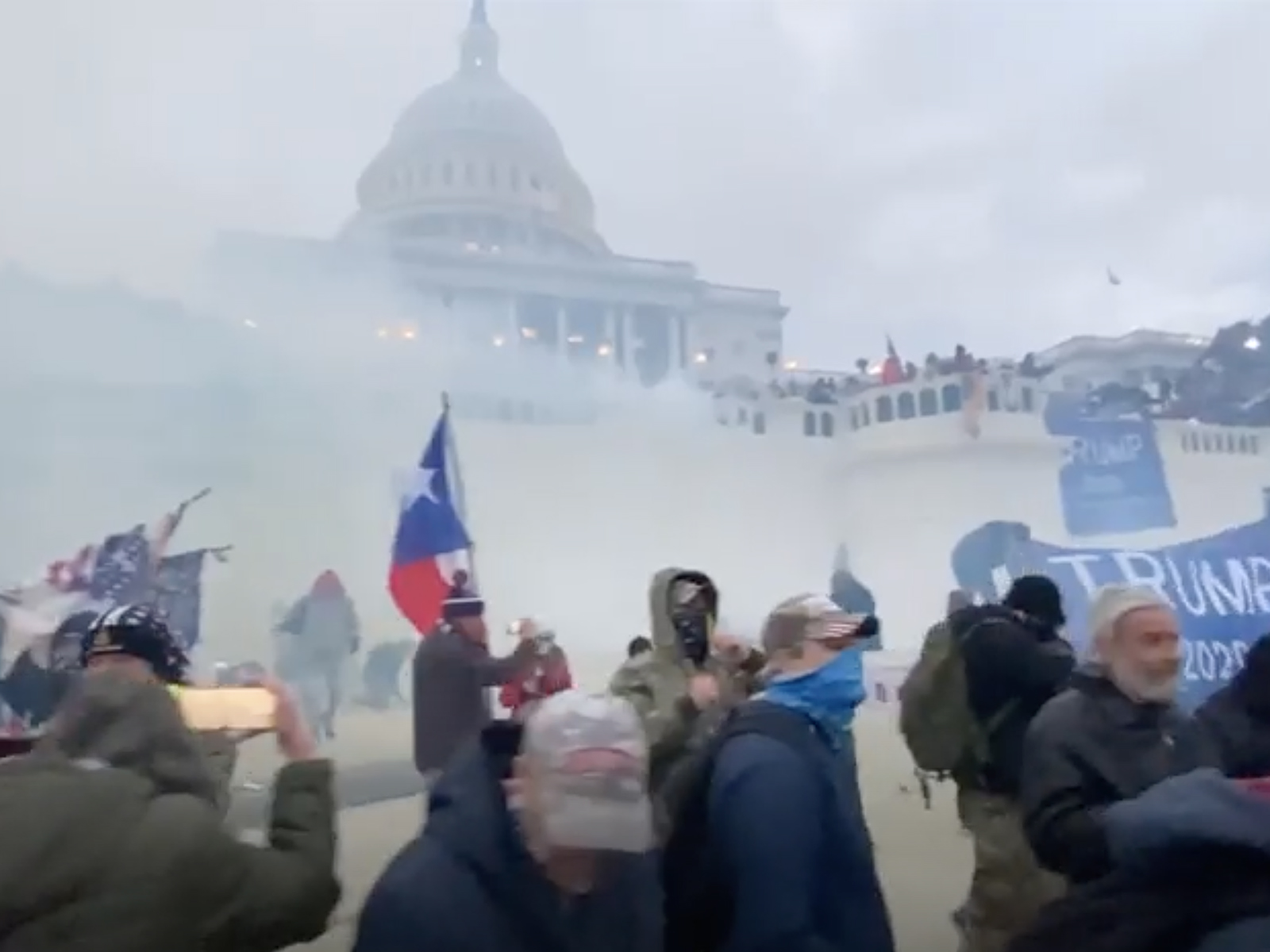
- Film
Docs: Four Hours at the Capitol
Arriving less than 10 months after Donald Trump’s supporters ransacked the United States of America’s seat of government in an attempt to forestall the certification of the country’s presidential election results, the new documentary Four Hours at the Capitol lands somewhat understandably as more of a rough first draft of history than a wholly refined, polished overview of the events of January 6, 2021. And yet, within that framework and context, it’s still a gut-punch work — a movie which, by way of its telling, grapples with the question of whether the alternate political and social realities in which Americans are seemingly living can coexist with the foundational principles of democracy, and in the end, sadly, affords no easy answer.
Constructed around the personal experiences of those on the ground and building out the events of the day with exclusive interviews and a wide array of surveillance, cell phone and body camera footage, director Jamie Roberts’ film is, as its title suggests, a fairly narrowly defined effort, focusing overwhelmingly on documentable facts of the day. Capitol Metropolitan police officer Michael Fanone, in many ways the public face of law enforcement accountability for the insurrection, opens the movie, providing brief but frank thoughts on the events of January 6. From the clipped profanity of these comments, a sort of instant clarity emerges — despite its outward-facing, somewhat straightforward and procedural trappings, it’s clear this will be a film in which various and at-odds subjective opinions, no matter their heatedness or even delusion, will be allowed to exist, leaving viewers free to draw their own conclusions about the actions of the participants. This is greatly to the movie’s benefit.
While there were many thousands of people present on the day in question, and their perspectives vary significantly, Four Hours at the Capitol does a good job of winnowing down its subjects to a manageable number. It also gives voice to many individuals who have not yet had their stories as widely shared. Interviewees include some very familiar faces, yes, like New York Senator Chuck Schumer (who recounts being grabbed by the collar by an officer during the tense moments of evacuation), but also Nancy Pelosi staffer Leah Han, New York Times photographer Ashley Gilbertson, Congressional Representatives Ruben Gallego and Buddy Carter, as well as various protestors/rioters like Dominic Box, Proud Boy members Eddie Block and Bobby Pickles, and provocateurs and conspiracy peddlers like Gateway Pundit’s Tayler Hansen and self-described independent “red pill” filmmaker Nick Alvear.
While there is some underscoring of notable timeline revelations (the first breach occurred 19 minutes before the end of Trump’s speech exhorting his followers to surge toward the Capitol Building, for example, suggesting some measure of coordination and strategy), this movie isn’t really a forensic work. The aforementioned interviewees stake Four Hours at the Capitol as a first-person document, giving it an engrossing (and at times depressing) sense of immediacy. Central to this, of course, are the bracing recollections of police officers like Keith Robishaw, Winston Pingeon, and Fanone, among others.
Filmmaker Roberts is no stranger to influential events and complicated legacies in which self-interested parties jockeying for favorable presentation exhibit extraordinary comfort embracing dishonesty, having helmed last year’s BAFTA-nominated tele-doc series The Rise of the Murdoch Dynasty. The sheer volume of material here is a tall order for the director and editor Will Grayburn, though, and sometimes the movie buckles under the weight of too many choices. The layout of the Capitol, and its assault from different sides, is at this point likely familiar to those who have absorbed any news coverage of the event, and in particular its ongoing round-up of suspects charged with various criminal offenses. But Four Hours at the Capitol could have benefitted from the simple integration of some maps and graphics, to provide a more coherent spatial sense of events discussed.
Though hardly a grave sin, the film also cheats its title a bit in the last five or six minutes, perhaps in a conciliatory stab at some measure of catharsis or at least shared humanity. Here, several interviewees detail the fallout of their participation in the breach of the Capitol (one, a New Mexico county commissioner and the founder of “Cowboys for Trump,” expresses amusingly righteous anger over apparently being denied the right to shower for nine days while held in jail). Then, in closing, the widows of two Capitol Hill police officers who died in the days after the January 6 assault share their heartbreaking stories.
In the end, however, Four Hours at the Capitol induces no small amount of queasiness. The lived experiences and stories shared — from a combat veteran Congressman readying to fight his way out of chambers to a police officer struggling with the after-effects of PTSD — should put a lump in one’s throat, no matter their political affiliation. That they likely won’t speaks darkly to a metastasizing cancer on the American body politic.

